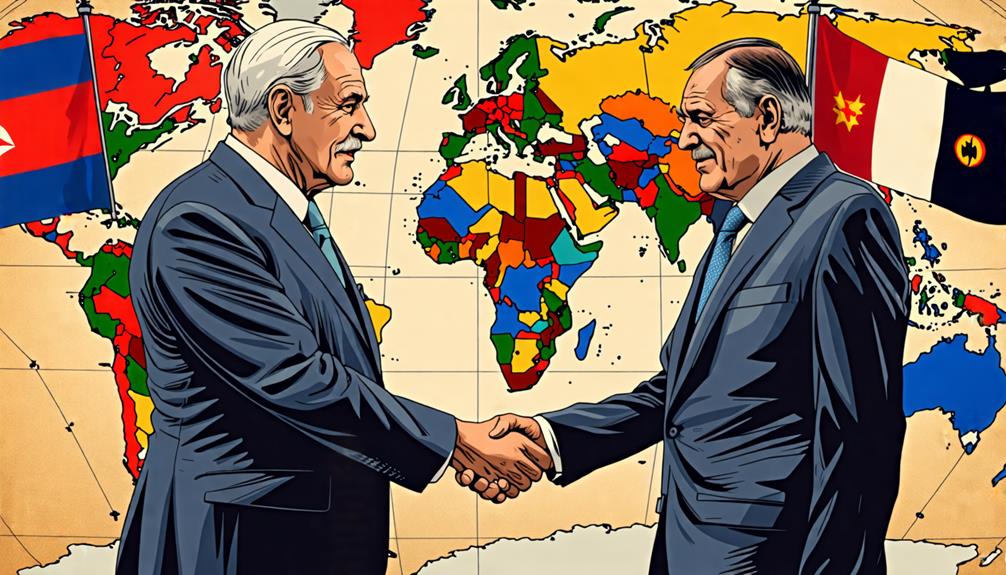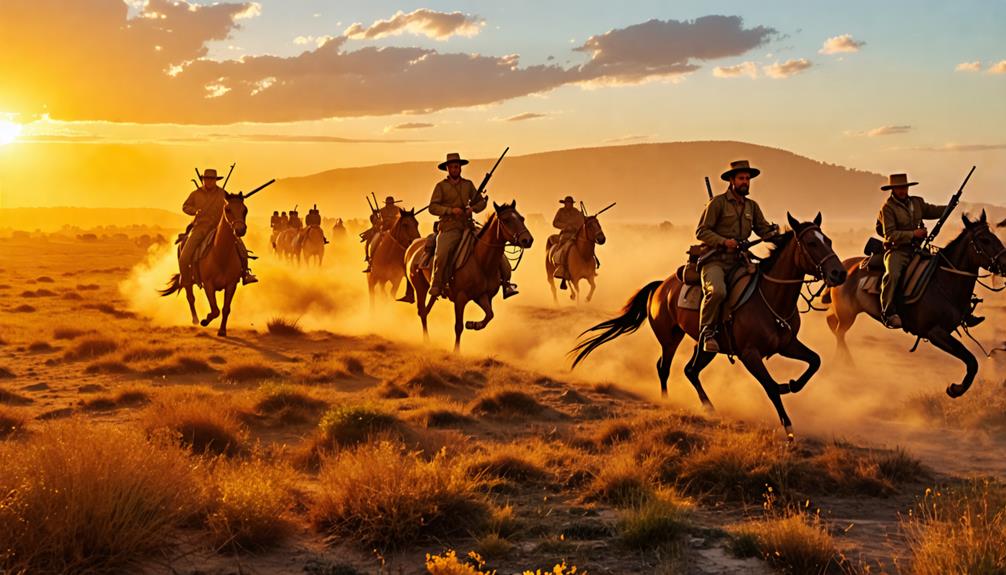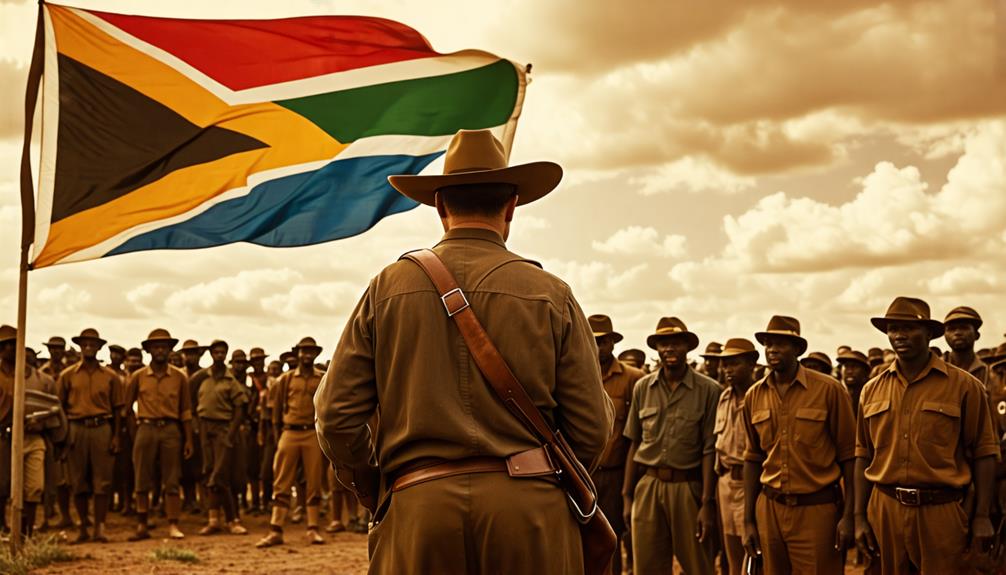Imagine a world where the Boer Republics triumphed against the British Empire in the early 1900s. This victory would have forever altered the course of southern Africa's history and had far-reaching consequences across the globe.
How would this change history if this scenario had occurred? The Boers would face challenging obstacles in establishing their place on the international stage, from economic instability to rising resistance movements.
The path ahead would be fraught with uncertainty.
Boer Republics' Resilience

In an alternative history scenario, the Boer Republics' resilience could have led to a prolonged conflict with the British Empire. One theory is that this would have drained British resources and weakened their global influence, potentially altering the course of World War I.
It's possible that a successful Boer resistance might've inspired other colonial subjects to rebel against their European rulers, leading to a wave of independence movements in the early 20th century.
This scenario bears some resemblance to the later decolonization struggles that occurred after World War II, although the specific outcomes would have depended on various factors unique to each region and time period.
British Empire's Response
In an alternate history where the Boers mounted a more resilient resistance, the British Empire would likely have taken forceful measures to maintain control. They may have significantly increased their military presence in the region, leveraging superior resources and manpower to quell the rebellion. Economic sanctions and blockades could also have been employed to weaken the Boer position.
Politically, one theory is that the British would have worked to undermine Boer leadership and exploit any internal divisions. This 'divide and conquer' strategy might've involved supporting rival factions or co-opting key figures to fragment the resistance. It's possible that the British could have made concessions to more moderate Boers while cracking down hard on die-hard rebels.
Interestingly, a similar scenario did play out several decades later during the Mau Mau Uprising in Kenya in the 1950s. There, the British used a combination of military force, population control measures like forced relocations, and political maneuvering to put down the rebellion. While the specifics differed, it demonstrates how the Empire responded to major challenges to its rule.
International Recognition

In this alternate history, if the Boers had established an independent state, gaining international recognition would have been crucial for its viability and standing among nations.
They likely would have pursued backing from European countries that were rivals of Britain, like Germany or France, in order to secure formal recognition, establish trade, and potentially create alliances as a deterrent to future British hostility.
It's possible that a Boer state could have altered the balance of power in southern Africa and impacted the region's political and economic development.
While this specific scenario didn't play out, similar struggles for independence from colonial rule occurred later in Africa and Asia with varying degrees of success and international support.
Economic Implications
In an alternate timeline where an independent Boer state emerged, economic challenges would likely have arisen due to its landlocked position, complicating trade relationships.
One theory suggests that the Boers' agricultural knowledge and mineral resources could have provided a foundation for economic growth, though this would have required adept management.
It's possible that pursuing self-sufficiency and fostering regional partnerships would have been crucial strategies for a young Boer nation to establish a viable economy.
Interestingly, a similar scenario did occur later in history with the creation of Rhodesia (modern-day Zimbabwe) as a self-governing colony in 1923, which faced comparable economic challenges and opportunities.
African Resistance Movements

In this alternative history scenario, African resistance movements would have posed a significant challenge to the economic stability of an independent Boer state.
Theories suggest armed uprisings and civil disobedience campaigns may have been employed to oppose Boer control and assert Indigenous rights.
Demands from resistance leaders for political power-sharing, land redistribution, and economic inclusion could have been made to address colonial and apartheid-era injustices.
It's worth noting that similar scenarios did occur later in history, such as in Rhodesia (now Zimbabwe) and South-West Africa (now Namibia).
World War I Impact
In an alternate historical scenario, an independent Boer state during World War I may have experienced significant challenges. One possibility is that they would've faced pressure to support the Allies with military forces and supplies, while also dealing with threats to their trade routes.
Additionally, they may have encountered German aggression from nearby colonies, making neutrality difficult to sustain.
It's conceivable that if the Boer republics had remained independent, they would've struggled to maneuver through the intricate geopolitical terrain of the Great War.
This scenario did play out to some extent decades later during World War II, as South Africa, while independent, grappled with its stance and level of involvement in the global conflict.
Apartheid's Emergence

If the Boer republics had achieved independence after the Second Boer War, it's possible that racial segregation policies in South Africa would have developed more rapidly. The Boer governments, free from British oversight, may have had greater latitude to implement discriminatory practices based on their racist ideologies.
Some historians theorize that an independent Boer state could have led to an earlier formalization of apartheid-like policies. Others suggest that the international community might've pressured the Boer governments to adopt more moderate stances on race relations, potentially delaying or altering the course of segregation in South Africa.
It's worth noting that apartheid-like policies emerged in other African colonies later in the 20th century, such as in Rhodesia (now Zimbabwe) under white minority rule from 1965 to 1979.
Conclusion
You can imagine the ripple effects a Boer victory would've had across the globe.
As they say, 'the devil is in the details' – and those details paint a complex picture of an alternate southern Africa rife with challenges.
Recognition struggles, economic instability, internal strife, and the looming specter of apartheid all could've shaped this hypothetical world.
In the end, the Boer Wars' outcome was pivotal in determining the trajectory of an entire region.

Leave a Reply